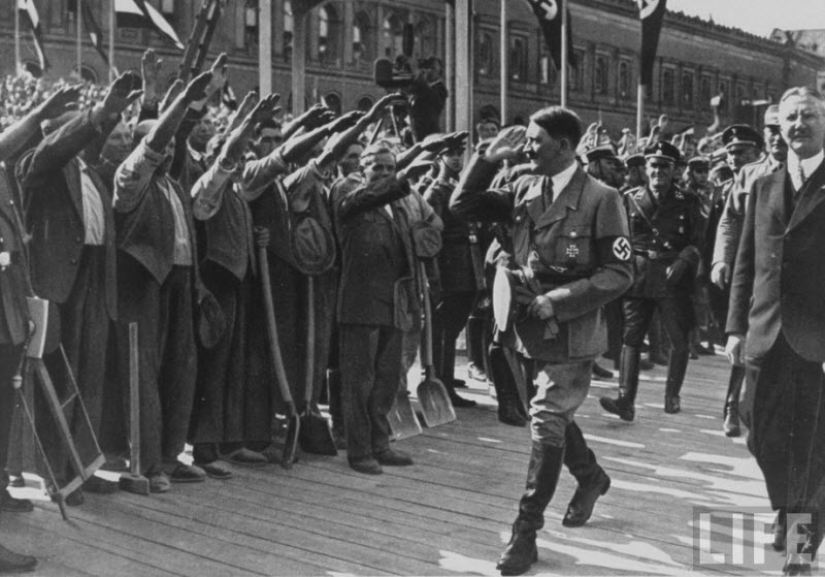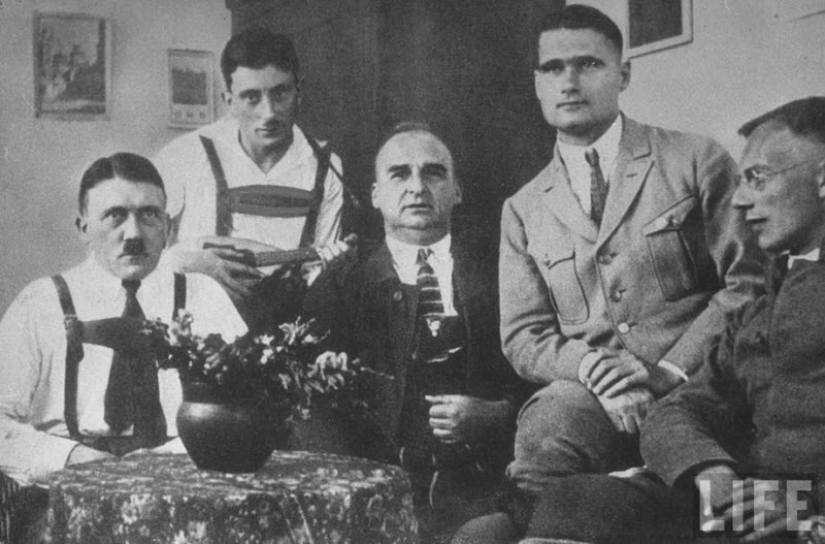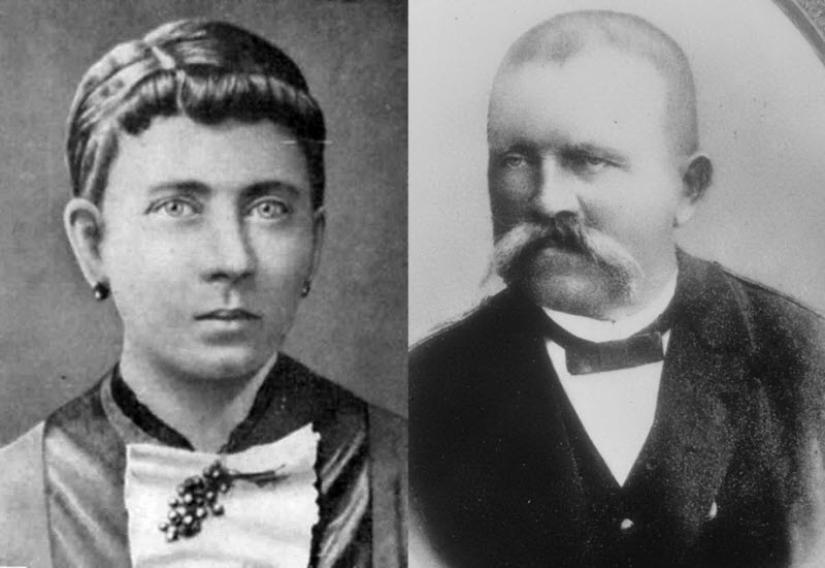The life of Adolf Hitler in photographs
"On the 124th anniversary of Adolf Hitler": Adolf Hitler ... Thousands of pages have been written about him, historians and political scientists, philosophers and writers turn to his personality, trying to understand the phenomenon of the Fuhrer. We will try to look at the life of this controversial person through the prism of a small selection of rare archival photographs arranged in chronological order.


1. "The grander the lie, the easier it is to believe in it." A. Hitler In the photo: Hitler in Landsberg prison during the visit of party comrades, including Rudolf Hess. 1924

2. Hitler's parents: Clara and Alois
3. Giler's birth certificate. 1989 Braunau, Austria
4. Little Hitler (third from left in the bottom row) with classmates. Fischlham, Austria. 1895
5. School photo 1901
6. 1904
7. Hitler in the crowd at Odeonplatz during the mobilization of the German army during the First World War. Munich, August 2, 1914
8. Volunteer Hitler (right) in the 2nd Bavarian Infantry Regiment of the Bavarian Army during the First World War. 1916
9. Hitler (back row, second from right) in a military hospital. 1918
10. Rising star of German politics. 1921
11. During the election campaign of 1923.
12. Hitler came out of Landsberg prison, where he wrote "Mein Kampf". December 1924
13. Hitler in shorts, 1924 “Some photos of Adolf Hitler look like a jester, but they prove that he experimented with his image. Those. Hitler was a very modern politician for his time,” reads the preface to the book “Hitler Was My Friend” by Heinrich Hoffmann, who was Hitler’s personal photographer.
14. "Apocalyptic, visionary, compelling." Staged photoset by Heinrich Hoffmann. 1925
15. The face of Nazism.
16. Portrait 1932
17. At the laying of a new Reichsbank building. May 1932
18. Speech at the trial in Leipzig 1933
19. Hitler during a visit to his prison cell in Landsberg prison, where he wrote "Mein Kampf" ten years ago. 1934
20. At a mass Nazi rally in Bückenburg, 1934
21. Hitler and Goebbels sign autographs at the 1936 Olympics.
22. Hitler says goodbye to those present leaving the New Year's banquet. Berlin, 1936
23. At someone's wedding
24. Thanksgiving in Bückeburg. 1937
25. On the construction of the autobahn
26. Hitler takes a standing ovation in the Reichstag after the announcement of the "peaceful" accession of Austria. 1938
27. Speaker
28. Hitler in brown Nazi clothes during an outdoor performance in Austria. 1938
29. At a rehearsal of the Leopoldhall orchestra in Munich. 1938
30. During a visit to the occupied Sudetenland in the city of Graslitz. 1938
31. At a Nazi rally in Eger, Czechoslovakia. 1938
32. With Austrian fans. 1939
33. May Day rally at the stadium in 1939. With the coming to power of Hitler, May 1 received official status in 1933. The date was called "National Labor Day". A day after the introduction, the Nazis broke into the premises of the trade unions and banned them.
34. At a Nazi rally
35. At the theater in Charlottenburg. May 1939
36. At a rally in honor of the Legion Condor returned from Spain. June 6, 1939
37. On board the ship Robert Ley, which left on its maiden voyage.
38. Hitler with guests at the table in his residence in Obersalzberg. 1939
39. During lunch on the front line. 1940
40. In Paris. 1940
41. At a Christmas banquet with the German generals. 1941
42. "Friend of children".
43.
44.
45.
46. Hitler with Emmy and Edda Goering. 1940 Emmy Goering - German actress, second wife of Hermann Goering. Since the then Reich Chancellor and Reich President of Germany, Adolf Hitler, did not have a wife, Emmy Goering was tacitly considered the “first lady” of Germany and, in this capacity, along with Magda Goebbels, who tried to play the same role, led various charity events.
47. "Friend of animals."
48. Hitler and Eva Braun with their Scottish Terriers.
49. Also, Hitler had a shepherd named Blondie.
50. Reading the morning press.
51. Hitler and Eva Braun. 1943
52.
53. Hitler, Goering and Guderian are discussing the Ardennes operation. October 1944
54. Hitler visits one of the officers, just like him, who suffered from an unsuccessful assassination attempt on him on July 20, 1944. After the assassination attempt, Hitler was unable to stay on his feet all day, as more than 100 fragments were removed from his legs. In addition, he had a dislocation of his right arm, the hair on the back of his head was scorched, and his eardrums were damaged. I was temporarily deaf in my right ear. He ordered that the execution of the conspirators be turned into humiliating torment, filmed and photographed. Subsequently, he personally watched this film.
55. Hitler and Propaganda Minister Goebbels. Poland, 25 July 1944
56. Hitler gives Reichsmarschall Goering a painting by Hans Makart "Lady with a Falcon" (1880). Both Hitler and Goering were passionate art collectors: by 1945, the Hitler collection consisted of 6755 paintings, the Goering collection - 1375. The paintings were acquired (including at reduced prices with the help of threats) by agents working for Hitler and Goering, donated , were confiscated from the museums of the countries occupied by Germany. Disputes over the legal status of some paintings from the former collections of the leaders of Nazi Germany are still going on.
57. One of the last photographs of Hitler. The Fuhrer in the garden of the Imperial Chancellery rewards the young members of the Hitler Youth brigade, mobilized to defend Berlin.
58. According to the official version, Hitler, along with his wife Eva Braun, committed suicide on April 30, after killing his beloved dog Blondie. In Russian historiography, the point of view was established that Hitler took poison (potassium cyanide, like most Nazis who committed suicide), however, according to eyewitnesses, he shot himself. There is also a version according to which Hitler, having taken an ampoule of poison into his mouth and bit through it, simultaneously shot himself with a pistol (thus using both instruments of death).
59. According to witnesses from among the attendants, even the day before, Hitler gave the order to deliver canisters of gasoline from the garage (for the destruction of bodies). On April 30, after dinner, Hitler said goodbye to people from his inner circle and, shaking hands with them, retired to his apartment with Eva Braun, from where the sound of a shot was soon heard. Shortly after 3:15 pm, Hitler's servant Heinz Linge, accompanied by his adjutant Otto Günsche, Goebbels, Bormann and Axmann, entered the Fuhrer's quarters. Dead Hitler sat on the couch; there was a blood stain on his temple. Eva Braun lay next to her, with no visible external injuries. Günsche and Linge wrapped Hitler's body in a soldier's blanket and carried it into the garden of the Reich Chancellery; Eve's body was carried out after him. The corpses were placed near the entrance to the bunker, doused with gasoline and burned. In the photo: the charred corpse of Hitler at the examination carried out by Soviet specialists.
60. An FBI montage taken in 1945 in case Hitler tried to hide by disguising himself.
61. There are a number of conspiracy theories claiming that Hitler did not commit suicide, but escaped. According to the most popular version, the Fuhrer and Eva Braun, leaving doubles in their place, hid in South America, where they lived safely under false names until old age. The photo allegedly depicts 75-year-old Hitler on his deathbed.
Keywords: Biography | Germany | Hitler | Leader | Personality | Nazism | Politics | Fascism
